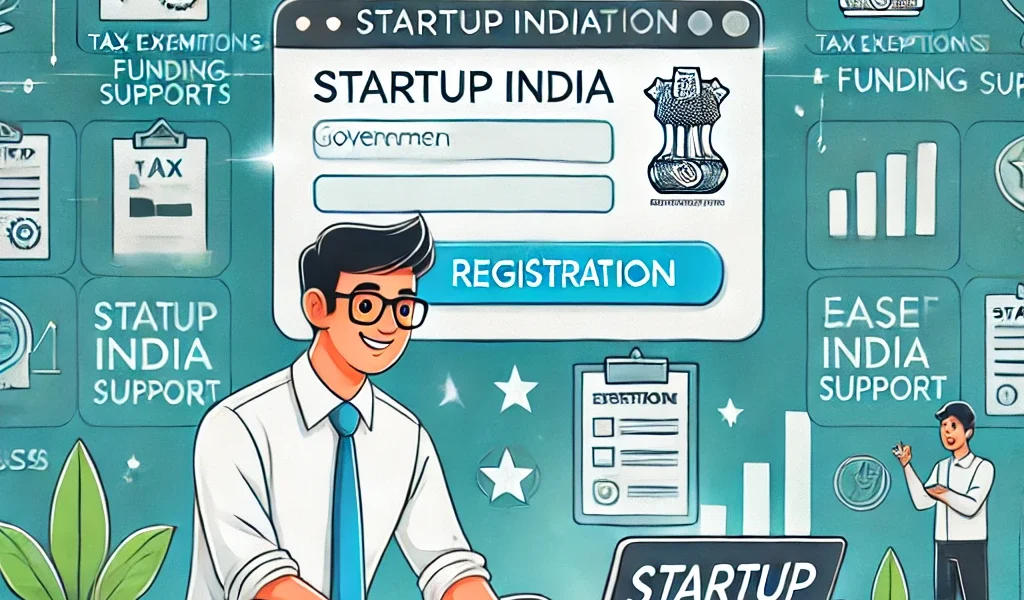Introduction
The Indian government launched the Startup India initiative to foster entrepreneurship, create job opportunities, and drive economic growth. This program offers a range of benefits, including tax exemptions, funding support, and regulatory ease, making it a crucial initiative for aspiring entrepreneurs. However, many startups miss out on these advantages due to a lack of awareness about the registration process and eligibility criteria.
This guide provides a step-by-step approach to registering under the Startup India initiative and maximizing the government benefits available to eligible startups.
Understanding Startup India Initiative
The Startup India initiative, launched in 2016, aims to provide startups with financial, legal, and business support. Some of the key objectives include:
- Encouraging innovation and entrepreneurship
- Reducing regulatory burdens on startups
- Providing tax benefits and financial assistance
- Enhancing ease of doing business
- Promoting research and development
By registering under this initiative, startups gain access to various schemes, grants, and networking opportunities.
Eligibility Criteria for Startup India Registration
Before registering, it is important to check whether your business qualifies as a startup under the initiative. The eligibility criteria include:
- Company Type: The business must be registered as a Private Limited Company, Partnership Firm, or Limited Liability Partnership (LLP).
- Age of the Business: The startup should be less than 10 years old from the date of incorporation.
- Annual Turnover: The company’s annual turnover should not exceed ₹100 Crore in any financial year.
- Innovation and Scalability: The business should be working towards innovation, improvement of existing products/services, or solving a significant problem.
- No Splitting or Reconstruction: The entity should not have been formed by splitting or reconstructing an existing business.
How to Register Under Startup India Initiative
Step 1: Incorporate Your Business
Before applying for the Startup India registration, ensure that your business is legally registered as either:
- Private Limited Company under the Companies Act, 2013 (Registered with Ministry of Corporate Affairs – MCA)
- Partnership Firm under the Partnership Act, 1932
- Limited Liability Partnership (LLP) under the LLP Act, 2008
The incorporation process requires obtaining a Certificate of Incorporation from the Registrar of Companies (ROC), along with the Permanent Account Number (PAN) and Tax Deduction and Collection Account Number (TAN) for tax purposes.
Step 2: Register on the Startup India Portal
Once incorporated, follow these steps to register under the Startup India Initiative:
- Visit the Official Startup India Website – Go to www.startupindia.gov.in
- Click on ‘Register’ – Create an account by providing basic details like name, email ID, and mobile number.
- Complete Profile Information – Fill in company details, director information, and business category.
- Upload Required Documents:
- Certificate of Incorporation/Partnership Registration
- Startup Pitch Deck or Business Plan
- Letter of Recommendation (if applicable)
- Proof of Concept (for innovative businesses)
- Submit the Application – Once all documents are uploaded, submit your application for review.
Step 3: Recognition by DPIIT
The Department for Promotion of Industry and Internal Trade (DPIIT) reviews applications and grants Startup Recognition if all criteria are met. Upon approval, the startup receives a unique recognition number and certificate, making it eligible for benefits.
Key Benefits of Registering Under Startup India
Once registered, startups gain access to several benefits, including:
1. Tax Exemptions and Financial Benefits
- Income Tax Exemption: Eligible startups can claim a 100% tax exemption on profits for 3 consecutive years under Section 80-IAC.
- Angel Tax Exemption: Startups receiving funding from angel investors are exempt from tax under Section 56(2)(viib).
- Capital Gains Tax Exemption: If capital gains are reinvested into funds approved by the government, the tax is waived.
2. Easy Access to Funding and Loans
- Fund of Funds for Startups (FFS): The government has allocated ₹10,000 Crore to support venture capital investments in startups.
- MUDRA Loans: Collateral-free loans up to ₹10 Lakhs under the Pradhan Mantri MUDRA Yojana (PMMY).
- SIDBI’s Credit Guarantee Scheme: Helps startups obtain loans with reduced risk.
3. Simplified Compliance and Legal Support
- Self-Certification for Labour and Environmental Laws: Startups can self-certify compliance with 9 labour and environmental laws.
- Faster Patent Registration: Reduced IPR (Intellectual Property Rights) filing fees and fast-track processing for patent applications.
- No Inspection for 5 Years: Startups are exempt from inspections related to labour laws for the first five years.
4. Government Tenders and Procurement Benefits
- Exemption from Prior Experience Requirement: Startups can bid for government contracts without prior experience.
- Easier Participation in Public Procurement: Recognized startups get priority in government contracts.
5. Networking and Mentorship Support
- Startup India Hub: A platform for networking with industry experts and investors.
- Startup Exchange Programs: Access to global startup collaboration programs.
- Accelerator and Incubation Support: Startups can enroll in government-supported incubators for mentorship.
How to Maximize Startup India Benefits
1. Ensure Proper Documentation
- Keep all business documents updated, including tax filings and compliance certificates.
- Maintain a clear and innovative business model to qualify for government grants.
2. Apply for Multiple Schemes
Many startups fail to utilize the full range of benefits available. Apply for:
- Startup India Seed Fund Scheme for early-stage funding
- Government Tenders under GeM (Government e-Marketplace)
- Accelerator and Incubation Programs
3. Seek Professional Guidance
Consult a startup consultant, chartered accountant, or legal expert to navigate compliance and funding opportunities.
4. Leverage Digital Tools
Use platforms like Startup India Portal, MSME Portal, and Invest India to stay updated on policies and upcoming opportunities.
Conclusion
The Startup India initiative is a game-changer for entrepreneurs looking to establish and scale their businesses. By registering under this scheme, startups can benefit from tax exemptions, funding opportunities, and reduced compliance burdens. However, to maximize these benefits, businesses must ensure proper documentation, apply for relevant schemes, and seek expert guidance.




